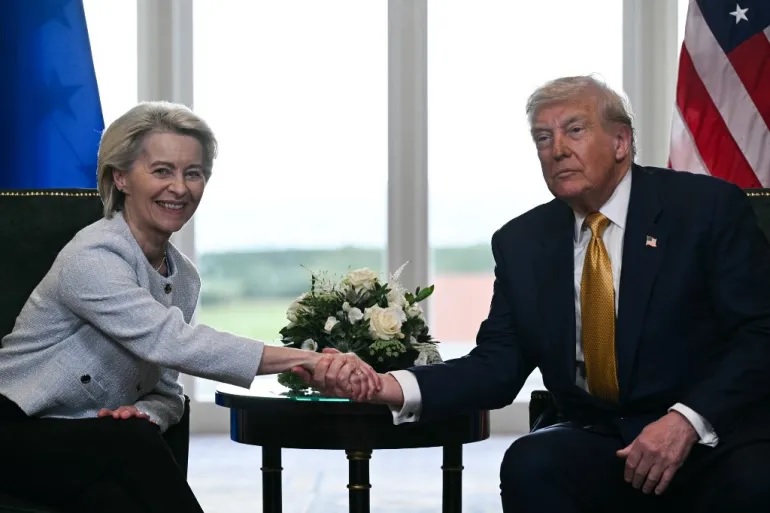U.S. President Donald Trump has announced the successful conclusion of a trade agreement with the European Union, putting an end to four months of intense negotiations between Washington and Brussels.
The deal, reached at Trump’s Turnberry golf resort in Scotland, significantly eases tensions by imposing a 15% tariff on most European goods – half of the originally proposed 30%.
European Commission President Ursula von der Leyen confirmed the breakthrough following a 40-minute meeting with Trump.
Speaking after the talks, she called it “a big deal, a huge deal” that promises to restore “stability” and “predictability” for both economies.
“The two largest economies globally should ensure a smooth trade relationship,” she said.
Trump described the agreement as “a powerful deal” and “an important partnership,” highlighting the EU’s pledge to boost purchases of American energy exports by tens of billions of dollars.
Before the meeting began, he remarked, “This is the biggest trading relationship in the world, it’s worth trying to get it right.”
Negotiations had been fraught with uncertainty until the final moments.
Just an hour before the meeting concluded, Trump warned that a deal was still only “50-50,” citing several unresolved issues.
Von der Leyen later admitted the discussion was “tough” and “very difficult,” referencing the tense atmosphere during their televised introduction.
“We had to work very hard to find common ground,” she said at Glasgow airport.
Trump’s tariff strategy appeared to have paid off, with the final 15% rate marking a significant jump from the pre-Trump era average of 4.8%.
Maroš Šefčovič, a senior EU official, acknowledged the compromise wasn’t ideal but stressed that ensuring long-term certainty and stability for European businesses was the priority.
However, the deal also introduces complications in Ireland.
Under the new terms, Northern Ireland-based traders can export to the U.S. at a lower 10% tariff, creating a potential imbalance across the island and prompting concerns about the Good Friday Agreement’s stability.
Ireland’s deputy prime minister, Simon Harris, expressed disappointment at the 15% tariff but emphasized the importance of clarity for businesses.
He noted that more details on how the deal will impact sectors like pharmaceuticals and aviation are still needed.
Harris also promised a thorough review of the implications for Ireland’s economy, especially regarding cross-border trade.
There was also ambiguity surrounding steel tariffs.
Trump indicated that a global 50% steel tariff would remain in place, while von der Leyen claimed that a quota system would be introduced instead.
Meanwhile, the UK steel industry continues to face 25% tariffs, despite earlier assurances from Trump that these would be eliminated.
Further discussions are expected when Trump meets with British Prime Minister Keir Starmer in Scotland on Monday.
Markets are likely to react positively to the news when they open, following months of volatility driven by fears of a broader trade war.
Investors have been closely monitoring developments, worried that aggressive U.S. tariff policies could undermine the global economy.
In a hopeful note, Trump also mentioned that progress was being made in negotiations with China.
He suggested the two sides were close to reaching an agreement, possibly including a 90-day extension on a tariff truce.
This was supposedly to allow for continued discussions before an August 12 deadline.
Reports from the South China Morning Post support this view.
Just last week, Trump reached a trade deal with Japan, the world’s fourth-largest economy.
This provided another boost to markets that had been shaken by protectionist policy announcements in his April “liberation day” speech.
At the Turnberry resort’s DJT Ballroom, where the EU delegation and U.S. officials met, Trump expressed his satisfaction with the outcome and praised von der Leyen’s team.
“They’ve been fantastic,” he said. After a handshake between the two leaders, both sides applauded the agreement.
Von der Leyen was joined by Šefčovič, her chief of staff Björn Seibert, Sabine Weyand, known for her role in the Brexit negotiations, and Tomas Baert, a key trade advisor.
The U.S. side included Commerce Secretary Howard Lutnick and Trade Representative Jamieson Greer, among others.







